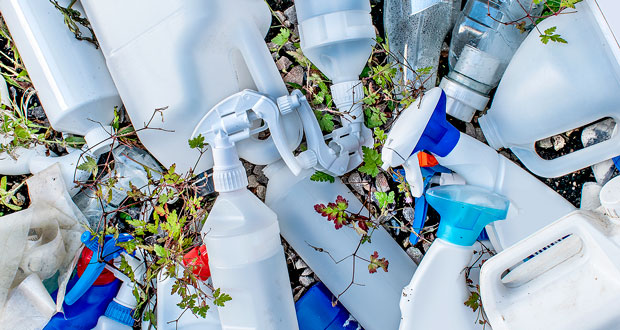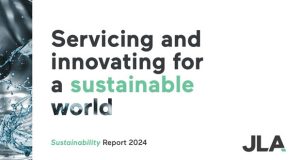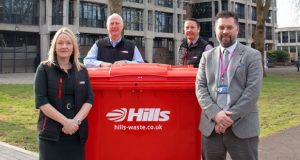Plastics, particularly waste plastics, are one of the most ubiquitous man-made materials on the planet. Waste plastics can be found on the peak of Mount Everest and the bottom of the Mariana Trench, in the Antarctic and Artic, in the Gobi Desert and the Amazon jungle.
In 2010, the global production of plastic was 270million metric tonnes. Ten years later in 2020, despite the impact of the pandemic, it was 367million metric tonnes, an increase of 36% in 10 years. Production is forecast to double by 2035.
Less than 12% of all plastic waste is recycled to make new plastics, while 40% is sent to landfill, 25% to incineration and 23% is dumped on land and in the sea. In the UK, while different sources state different statistics, it is probable that around 20% of plastics are recycled, however this also takes account of plastic waste that is exported to third world countries where much is either burnt or dumped – we export our problems to make our home statistics look better. We think that the plastic we use is recycled responsibly, but just because a bottle or container says it is recyclable, does not mean it will actually be recycled and used again. Many recyclable plastics become single use.
Plastic also takes a significant amount of water to manufacture. It takes between 15-20ls of water to make 1 x 5l container – 3-4 times as much as the volume of the container. Water is also used to drill for oil and gas which is the base material for most modern plastics. The ‘water footprint’ of plastic production is considerable and given the increasing pressure on water resources due to climate change, reducing plastic consumption and waste should be a priority of any government, corporate and individual.
Plastics also have a carbon footprint. The manufacture of 1kg of PET (polyethylene terephthalate) plastic can produce up to 3kgs of carbon dioxide. Processing plastic resins and transporting plastic bottles contribute to a bottle’s carbon footprint in a major way. Estimates show that 1 x 5l plastic container can have a total carbon footprint equal to 828 grams of carbon dioxide.
As well as general plastic waste, microplastics are an increasingly proliferating factor in our lives and in the environment. It is now scientific fact that microplastics are found in animals and fish, entering the human food chain. Microplastics are present in the soil, in the sea and even in the air. We ingest them in the food we eat and we inhale them in through the air we breathe.
We cannot live our normal lives without plastics, however we can take steps to reduce our use and in so doing help enhance our health and reduce the environmental impact that plastic production and disposal causes.
The majority of cleaning and disinfection chemicals are manufactured in central factories, then packaged in plastic containers and packaging, then transported to distribution hubs before finally being delivered to client sites. Month after month. After use, the plastic containers and packaging has to be disposed of – hopefully for recycling, but can find their way to landfill or simply being dumped. The carbon and water footprints of this process is excessive and preventable.
ECA technology can substantially reduce the environmental impact of cleaning and disinfection regimes by generating solutions on-site. The process requires simply water and salt – both natural and naturally sustainable – and small amounts of electricity to produce safe and highly effective cleaning and disinfection solutions. The ECA systems themselves have a carbon emission footprint for manufacturer and delivery to site, but once there the pollution footprint is virtually zero, and the reduction in the use and disposal of plastics and residue chemicals is significant.
 By adopting ECA technology and systems, corporates and public sector organisations can contribute positively and proactively to reducing climate change – and save costs at the same time. It is an easy step to take, but one that will enhance hygiene and safety in the working environment, and engage with staff and customers by showing environmental leadership. It is no longer discretionary – it is everyone’s responsibility to be on the right side and take small steps which ultimately will help restore our environment.
By adopting ECA technology and systems, corporates and public sector organisations can contribute positively and proactively to reducing climate change – and save costs at the same time. It is an easy step to take, but one that will enhance hygiene and safety in the working environment, and engage with staff and customers by showing environmental leadership. It is no longer discretionary – it is everyone’s responsibility to be on the right side and take small steps which ultimately will help restore our environment.
- 367m tonnes global production of plastics 2020
- 36% increase in production in 10 years
- 88% of all plastics are not recycled
- 8m tonnes of plastic enters the oceans every year
- 400 years in landfill before plastics degrade
- 15-20ls of water required to manufacture a 5l plastic container
- 1kg plastic will produce 3kgs of CO2
- 8% of world oil production is used to make plastics
- 350mls of oil to produce a 5l plastic container
- 3kgs of CO2 released for every 1kgs of PET plastic manufactured
For more information visit https://centregoltd.com/
-ends-
To have your industry news published in the pages of FMJ’s news section, Month in FM, and here online on fmj.co.uk, please send your news and image to Danny Grange danny.grange@kpmmedia.co.uk
The view or information contained within these unedited press releases, are that of the company producing it and not necessary the views of kpm.





